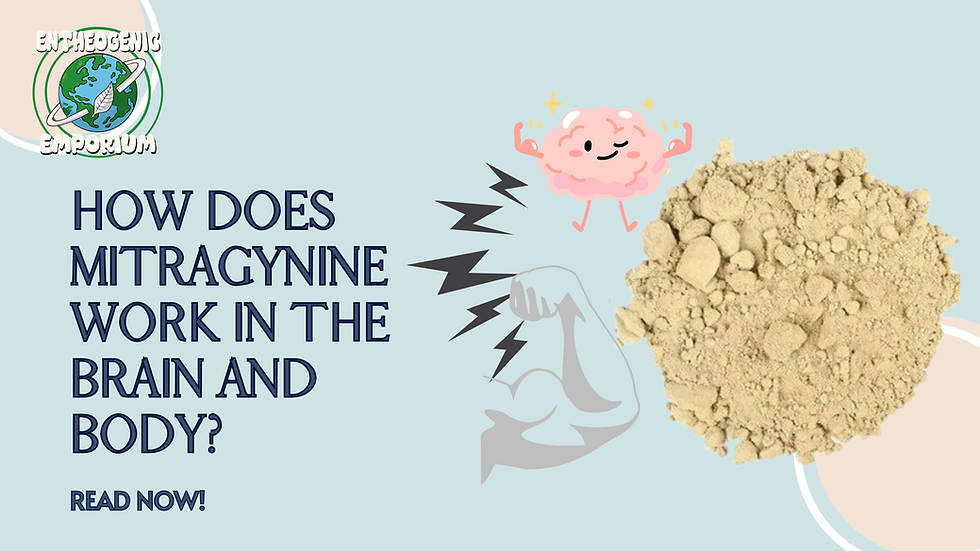Should Kratom Be Restricted? The Truth About 7-OH & Mitragynine
- Rob Heals
- Aug 9
- 3 min read
Ask at any herb shop, check botanical forums, or speak with veteran herbalists, and you will easily get Kratom a tropical evergreen tree endemic to Southeast Asia (Mitragyna speciosa).
Thai, Indonesian, and Malaysian cultures have utilized Kratom leaves for centuries in their own lives. Two special alkaloids Mitragynine and 7-Hydroxymitragynine, or 7-OH are the prevailing essence of its distinctive character. The alkaloids fascinated scientists and researchers in natural health but are now also in the crosshairs of mounting regulatory attention in some regions.

The million-dollar question: Do Kratom and its alkaloids necessarily need to be prohibited, or is there an alternative?
What are Kratom's Alkaloids: Mitragynine and 7-OH
Out Of kratom's over 40 naturally occurring alkaloids, two are prominent:
Mitragynine – The primary alkaloid in Kratom most responsible for its typical profile.
7-OH – Was found in smaller amounts but played a huge role in the overall effect profile of Kratom.
In contrast to lab-made pure substances, these alkaloids synergistically act upon the whole plant biochemistry of Kratom to form a synergy difficult to mimic in the lab.
7 Reasons Restricting Kratom May Be A Mistake
1. Preserving Cultural Heritage
In Southeast Asia, Kratom is a part of everyday life and public culture. Prohibition dismisses centuries of ethnobotanical tradition.
2. Natural Synergy Over Synthetics
Kratom's complex alkaloid chemistry offers a depth of natural subtlety that chemical replicas can merely aspire to mimic.
3. Education is safer than prohibition
Bans seldom prevent use they drive it underground. Regulated, informed access helps ensure safety much better than prohibition.
4. Foreign Demand Expansion
From rural Southeast Asia to global modern herbal societies, Kratom demand is increasing. Regulation may push consumers toward less-studied, unregulated products.
5. Agri & Economic Support
Kratom cultivation supports thousands of families throughout Southeast Asia and ensures sustainable cultivation. The bans are danger to livelihood and the environment.
6. Enhancing Scientific Research
7-OH and mitragynine are of special research interest. Banning Kratom or its alkaloids could put the brakes on valuable research. These compounds are capable of teaching us so much more, and restriction in availability can silence advances in plant biology and herbal discovery.
7. Protection of the Right to Decide
Adults must be left to their own discretion in deciding whether or not they wish to experiment with botanicals such as Kratom. Considered access that is exceedingly well-informed is consistent with personal freedom and personal choice.
Prospects of Mitragynine and 7-OH The complexity is the strength of Kratom. Mitragynine produces a distinct botanical profile, and 7-OH, while in minute amount, is a significant contributor to the plant profile.
When responsibly produced such as Entheogenic Emporium's Kratom and Mitragynine product line, these alkaloids can be blended into an open, educated herbal experience.
These Kratom and Mitragynine products are also available on our sister site: ROOTS KAVA BAR
with a physical store at 250 E Main St. Port Jefferson, NY.
Regulation Not Restriction

The solution is not prohibition but responsible regulation, i.e.:
Accurate, comprehensive labeling
Third-party quality and safety laboratory testing
Consumer education and open sourcing
This strategy ensures Kratom is preserved safe, available, and grounded in scientific and cultural respect.
Final Word
Kratom is not just a plant it is a living cultural doorway to modern botanical discovery. By controlling instead of prohibiting, we are preserving cultural heritage, enabling scientific inquiry, promoting sustainable livelihoods, and upholding consumer freedom of choice. Instead of driving Kratom underground into the unregulated marketplace, let us just leave it alone where it is in a secure, open, and informed environment for consenting adults to use freely.




Comments